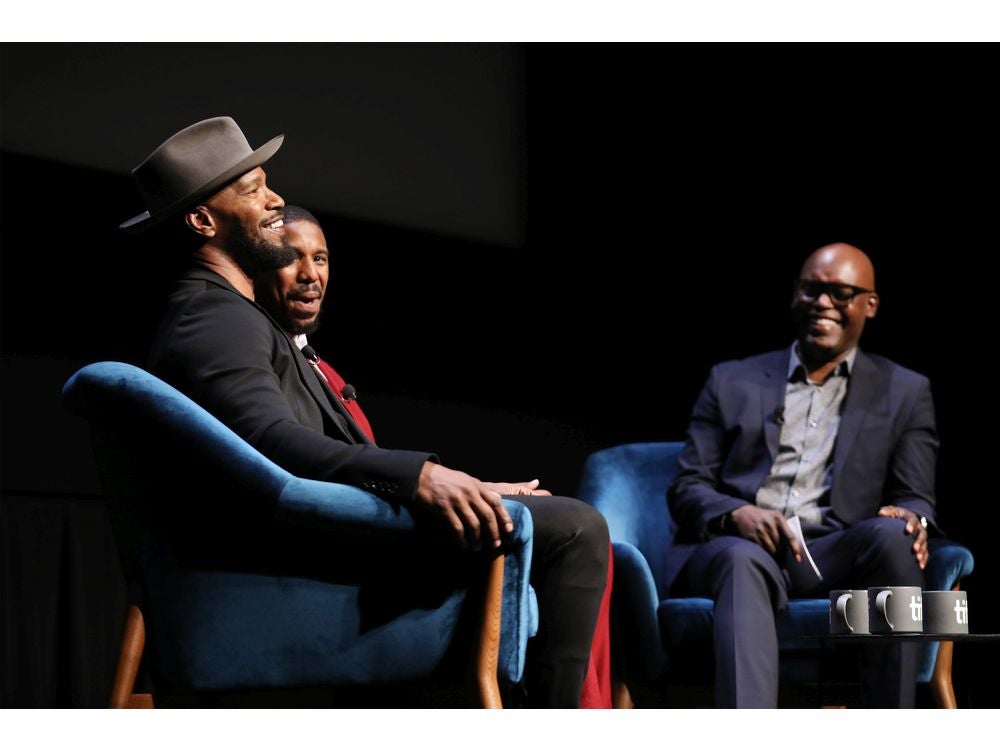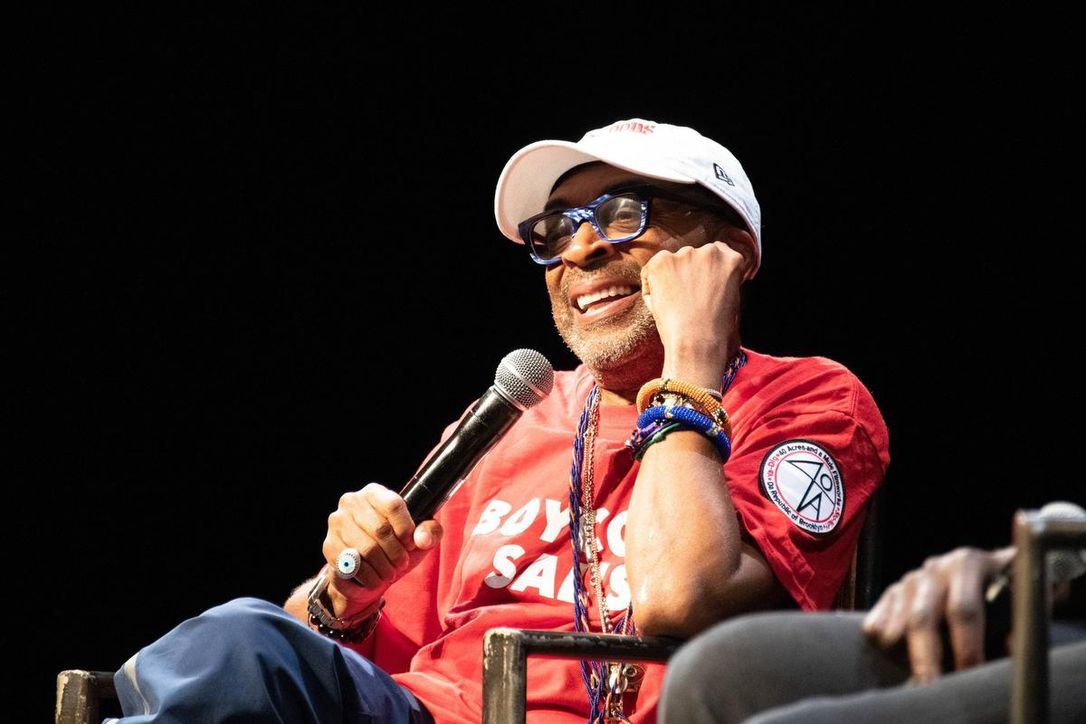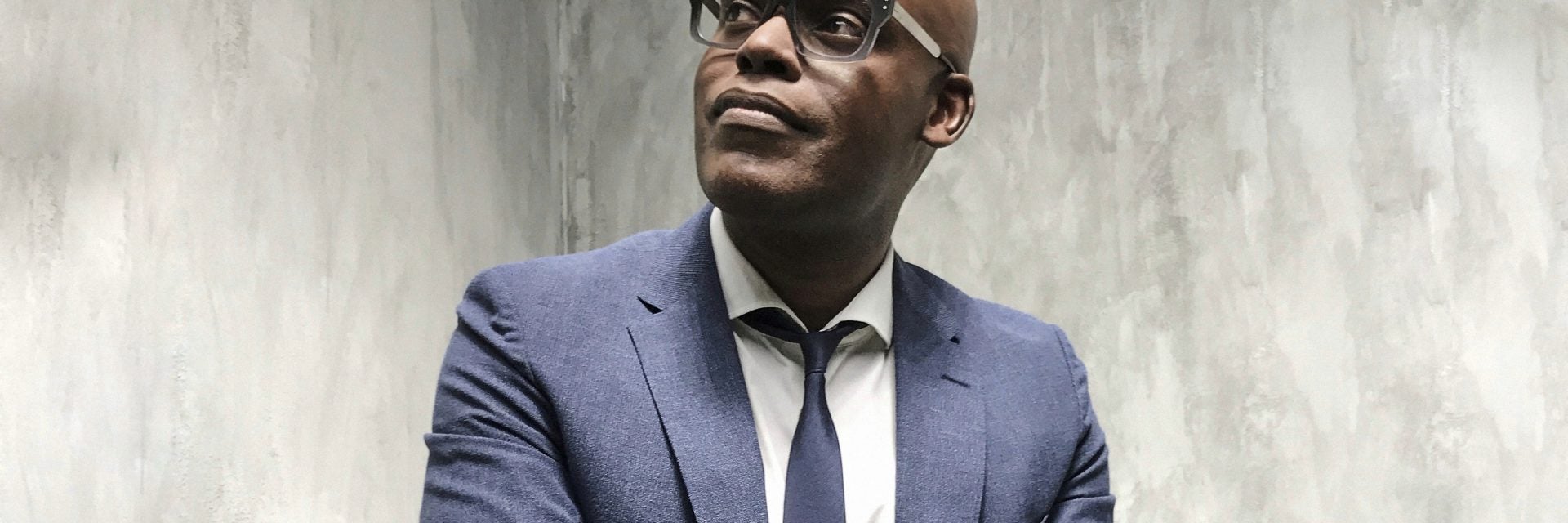There’s so much to do and see during the Toronto International Film Festival, which kicked off its 44th year last Thursday and comes to a close on Sunday. But no matter which screening or event you attend, there’s one person who’ll likely be in the house: TIFF’s Artistic Director and Co-Head, Cameron Bailey.
It’s not a stretch imagining Bailey’s calendar during the 11-day festival (and that of Joana Vicente, with whom he shares Co-Head duties) has been strategically-scheduled, down to the minute, and color-coded. Perhaps that’s why I was surprised to see him three times during my four-and-a-half days of film-hopping.
First, in Theater 1 of TIFF’s legendary Bell Lightbox, where he led a spirited conversation with Just Mercy stars Jamie Foxx and Michael B. Jordan. Then, at the world premiere of Dolemite is My Name at the Princess of Wales Theater, he introduced and interviewed the cast, including Eddie Murphy, who was greeted with uproarious applause. I saw Bailey a final time when he arrived at Momofuku Noodle Bar on University Avenue to greet guests at the 4th annual luncheon hosted by the African-American Film Critics Association. Each time I saw him, he was prepared, personable and on-point. Simply stated, Cameron Bailey represents, well.

After months planning and just before he got swept up in the festival’s whirlwind, I sat with Bailey for a few to discuss his love of film (and those he’s excited about this season), how he found his way to his current role and why he seeks to make TIFF an inclusive, welcoming environment.
ESSENCE: So, as Artistic Director and Co-Head of TIFF, you oversee the festival, the organization and year-round programming?
CAMERON BAILEY: Yes, there are a lot of things we do throughout the year. At the Lightbox, we have five cinemas where we’re running new films year-round. We have a cinematheque, too, where we run retrospectives. In the fall, we’re doing one with Euzhan Palcy. We also have learning programs, work with the youth and collaborate with 160 film clubs across Canada to set up screenings.
ESSENCE: What does a typical day look like for you?
BAILEY: Well, on a good day, I’m watching lots of movies. There are also planning meetings and a good amount of travel, which I like. I attend many of the major film festivals, where I’m meeting people and seeing more films, some of which we invite to TIFF.
I also like discovering what’s going on in other parts of the world. Whether I’m in Beijing or Iceland or Tanzania, I want to see who’s making films. Getting to know what’s happening in film, globally, is part of the job, too.
ESSENCE: So, you know film!
BAILEY: Well, yes…that’s one thing I know! [laughs]
ESSENCE: You began your career as a journalist and ventured into broadcasting. How did you find your way to TIFF?
BAILEY: In university, I studied literature and I took just one film course, as an option, and it kind of blew my mind open. I started seeing more films and writing about films for the campus newspaper. After graduating, I got a job as a critic for Toronto’s alternative weekly.
I began doing a little bit of programming, too. I did a retrospective of Paul Robeson films at a small, independent cinema and the festival team, at the time, noticed. The first time they approached me, I actually said “No” because I didn’t think I was ready. When they came back a year later, I thought I’d be an idiot to say “No,” twice!
So I came onboard and was programming the Canadian films. A few years later, I went with a then-director of the festival to Burkina Faso, in Ouagadougou, for Fespaco, which is the biggest Pan-African film festival. I really got into African cinema and began selecting the African films for the festival. Then, I left [for a while] and started broadcasting. I co-hosted a television show in Toronto, presenting movies. In 2008, the festival approached me about the Co-Director job and I’ve been doing some version of that job ever since.
ESSENCE: Do have a favorite film?
BAILEY: I watch a lot of movies, so I can’t say that I have one favorite.
Hitchcock’s Vertigo is one that I can go back to time and again. I also love a film called, In the Mood for Love, from Hong Kong. We just had Spike Lee come to present Do the Right Thing for the 30th anniversary, and that’s one that I love, too. I can watch that over and over. It really holds up.

ESSENE: Can you talk about TIFF’s prestige in the film industry?
BAILEY: This is our 44th festival and I think the thing that we started with is what we still have, which is the audience. The really unique quality of our festival is that we have a public audience in Toronto that loves movies.
Also, I think it actually helps that we’re in North America, but not in the U.S., because you get a slightly different perspective. Toronto is a very cosmopolitan city and we have people from over 150 different countries, so they respond to all kinds of movies, with a sense of passion and curiosity. The industry that comes to Toronto – from LA and New York, Hong Kong, London and Paris – wants to see how the audience responds. The same goes for the media.
ESSENCE: Which films are you excited about presenting this year?
BAILEY: Just Mercy is one that I found to be really powerful. I was angered and moved and shaken by that film…and it stayed with me. Destin Cretton is a terrific filmmaker and the performances are so strong.
Taika Waititi’s Jojo Rabbit is another. It’s an incredibly audacious film and I think he took a lot of risks by playing an imaginary Hitler. The film is set during World War II and [examines] how people learn – and can unlearn – hate.
I absolutely love several films in our competitive section, Platform, which features independent and not-so-big budget films. There is Sound of Metal, by Darius Marder, with Riz Ahmed in the lead. We also have Rocks, from the U.K., about a group of high school girls, one of whom loses her mom and has to depend on her friends. It’s really, really good. I could go on and on…
ESSENCE: From the types of films screened to the festival attendees, there are so many different types of people, so much diversity. Why is creating that type of environment so important?
BAILEY: The simple answer is that this is the world that I, and many other people, live in. If you live in a city like LA or New York or Toronto or London, this is what you move around in, it’s the air you breathe, right? Why should it be different when you go to a film festival? I don’t believe it should be.
So, I want what happens at our festival to reflect the world that I move around in, that is diverse and has complexity to it. I like that. I feel like that should be reflected.
ESSENCE: Can you share one of your proudest moments?
BAILEY: Early on, when I was fairly new as Co-Director, I attended Sundance where I saw Lee Daniels’ film, Precious. I was in that first screening and during the Q&A, Lee got a phone call…and he took it! [laughs] If I recall correctly, it was Oprah calling to tell him how much she loved the movie.
I invited Precious to TIFF and decided to play it as a gala at Roy Thomson Hall, which seats 2,000 people. By that time, Oprah and Tyler Perry had come onboard and everybody was there – Oprah, Tyler, Lee, Gabourie Sidibe, Mariah Carey and Mary J. Blige, who sang the theme song – and I introduced them one after the other.
There was an audience that was crying out for that kind of film and [I’d like to think] that they left with something, that the film transformed somebody. It was one of those moments that makes you feel like, “Okay, you can make a difference.” My mom was in the house that night, too. It was just electric!
ESSENCE: What do you think your presence at the helm of TIFF means to up-and-coming creatives, on a global level?
BAILEY: As I get older, I’m becoming more aware of helping young people who are just starting out. There’s often a fundamental question of “Do I belong here?” that many people face, people who don’t automatically see others who look like themselves when they walk into a room.
Many parts of the world [aren’t very diverse], so if you walk in as a Black person, as a woman, as a queer person, you might not feel like you belong. And if I can do anything, I want to try to let people know that, “Yes, you can take that space. You can belong.”
I’m an immigrant to Canada. My mother was a nurse and raised me and my sister as a single parent. I had no connections, you know? I didn’t have any anybody I could call to get into the business. It’s not easy. You’ve got some work to do, of course, but I just want people to know that it is possible.

